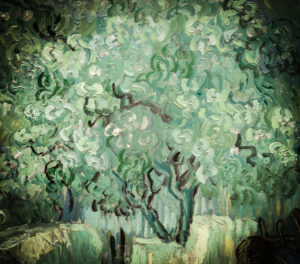—Ink and Echoes—

Seven Notes &
the Mind of God
John Henry Newman
—1843—

Premium Subscribers
Sorry, this feature is only available for H&F Print Premium subscribers. You can sign up here.
(If you are already a Print Premium subscriber, be sure to click the authentication link you were sent by email so this won't happen again.)
The cogitative method, as it may be called, of one man is notoriously very different from that of another; of the lawyer from that of the soldier, of the rich from that of the poor. The territory of thought is portioned out in a hundred different ways. Abstractions, generalizations, definitions, propositions — all are framed on distinct standards; and if this is found in matters of this world between man and man, surely much more must it exist between the ideas of men, and the thoughts, ways, and works of God.
One of the obvious instances of this contrariety is seen in the classifications we make of the subjects of the animal or vegetable kingdoms. Here a very intelligible order has been observed by the Creator himself; still one of which we have not, after all, the key. We are obliged to frame one of our own; and when we apply it, we find that it will not exactly answer the Divine idea of arrangement, as it discovers itself to us. . . . Mathematical science will afford us a more extended illustration of this distinction between supernatural and eternal laws, and our attempts to represent them, that is, our economies. Various methods or calculi have been adopted to embody those immutable principles and dispositions of which the science treats. . . . Yet none of them carries out the lines of truth to their limits. . . .
 Let us take another instance, of an outward and earthly form, or economy, under which great wonders unknown seem to be typified; I mean musical sounds, as they are exhibited most perfectly in instrumental harmony.
Let us take another instance, of an outward and earthly form, or economy, under which great wonders unknown seem to be typified; I mean musical sounds, as they are exhibited most perfectly in instrumental harmony.
There are seven notes in the scale; make them fourteen; yet what a slender outfit for so vast an enterprise! What science brings so much out of so little? Out of what poor elements does some great master in it create his new world! Shall we say that all this exuberant inventiveness is a mere ingenuity or trick of art, like some game or fashion of the day, without reality, without meaning? We may do so; and then, perhaps, we shall also account the science of theology to be a matter of words; yet, as there is a divinity in the theology of the Church, which those who feel cannot communicate, so is there also in the wonderful creation of sublimity and beauty of which I am speaking. To many men the very names which the science employs are utterly incomprehensible.  To speak of an idea or a subject seems to be fanciful or trifling, to speak of the views which it opens upon us to be childish extravagance; yet is it possible that that inexhaustible evolution and disposition of notes, so rich yet so simple, so intricate yet so regulated, so various yet so majestic, should be a mere sound, which is gone and perishes? Can it be that those mysterious stirrings of heart, and keen emotions, and strange yearnings after we know not what, and awful impressions from we know not whence, should be wrought in us by what is unsubstantial, and comes and goes, and begins and ends in itself?
To speak of an idea or a subject seems to be fanciful or trifling, to speak of the views which it opens upon us to be childish extravagance; yet is it possible that that inexhaustible evolution and disposition of notes, so rich yet so simple, so intricate yet so regulated, so various yet so majestic, should be a mere sound, which is gone and perishes? Can it be that those mysterious stirrings of heart, and keen emotions, and strange yearnings after we know not what, and awful impressions from we know not whence, should be wrought in us by what is unsubstantial, and comes and goes, and begins and ends in itself?
It is not so; it cannot be. No; they have escaped from some higher sphere; they are the outpourings of eternal harmony in the medium of created sound; they are echoes from our Home; they are the voice of Angels, or the Magnificat of Saints, or the living laws of Divine Governance, or the Divine Attributes; something are they besides themselves, which we cannot compass, which we cannot utter,— though mortal man, and he perhaps not otherwise distinguished above his fellows, has the gift of eliciting them.





















